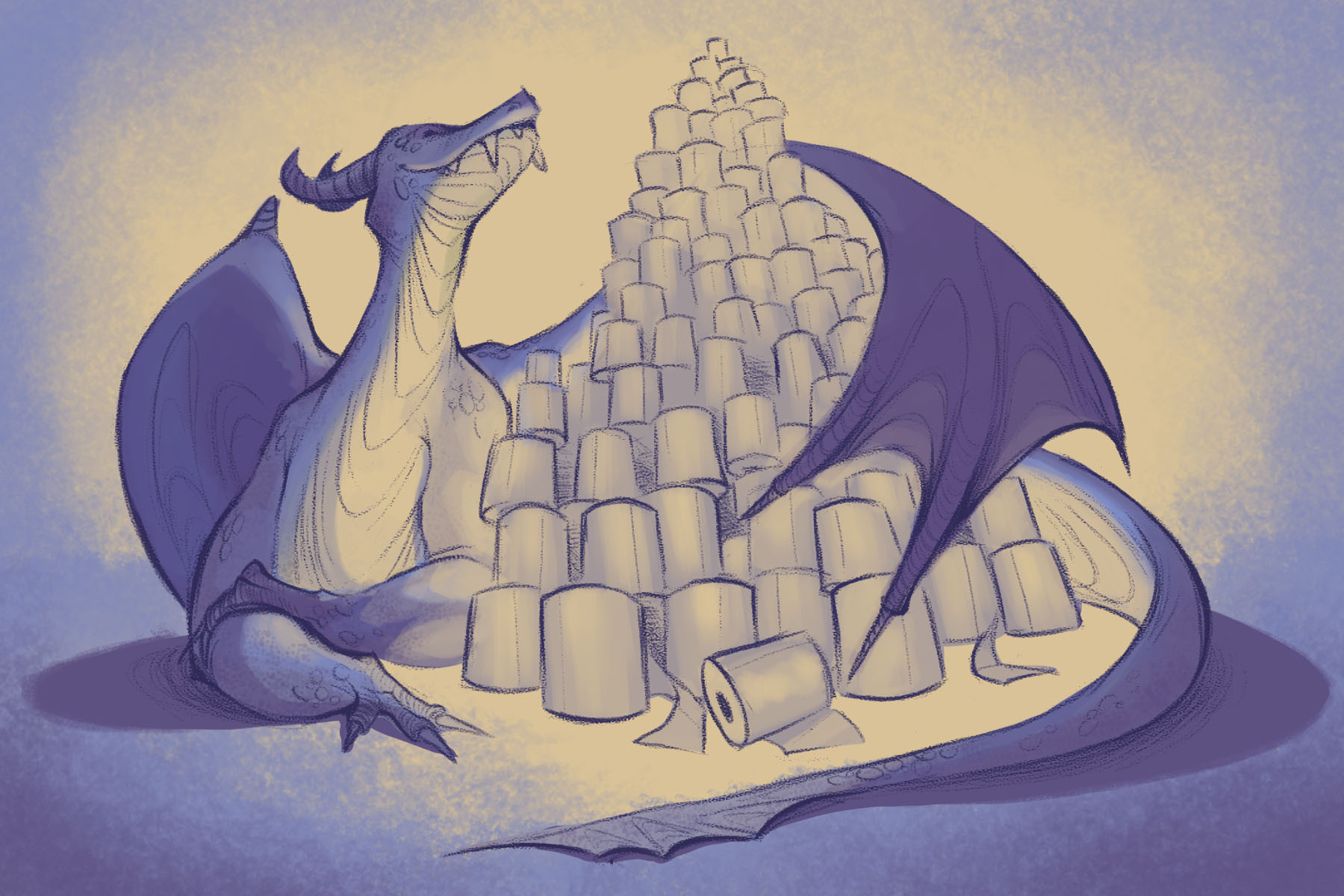Throughout the coronavirus crisis, many of us have experienced walking past empty shelves in the grocery stores. When stay-at-home orders first hit, herds of frightened shoppers flocked to supermarkets to stock up on the items they might need during quarantine. Anxiety levels ran high as shoppers realized that they wouldn’t be able to get some of the items on their lists.
Since the initial panic, encounters with resultant scarcities have fueled continued hoarding when supermarkets restock. Many of us have learned that seeing empty shelves awakens competing drives within us: both an anxious urge to hoard, and an anger toward others for doing the same.
It may seem as though these actions would be motivated by very different impulses. Buying too much seems selfish but urging people to only buy what they need seems to be community oriented. However, the underlying logic behind hoarding and shaming are actually identical.
There are several reasons why the pandemic initially drove us to buy more. When most restaurants shut down and stay-at-home orders first went into effect, a higher percentage of our daily meals came from the supermarket. Some people whose lifestyles centered around eating at restaurants needed to buy as much food at the store as those who routinely cooked for themselves.
The unprecedented governmental regulations also created a lot of uncertainty, which further fueled our hoarding behavior. Families began to hear about travel and trade restrictions. With this new information, they considered how the pandemic might affect the supply chain, and worried that they soon wouldn’t have access to several staple items like toilet paper or non-perishables.
Those urged to stay home fretted that they wouldn’t be able to get to the supermarket frequently enough to replenish items. People unsure of how to protect themselves or their loved ones hoarded hand sanitizer and other cleaning supplies, desperately arming themselves against an invisible enemy. Some government officials such as the Canadian health minister initially encouraged stockpiling because of the possibility of complications caused by quarantine measures.
Quarantine orders surrounded us in more generalized uncertainty as well. When everything that was once “normal” came screeching to a halt, we had no way of knowing what to do, or how to act. Neurobiologically, in such times of stress, human beings are wired to hoard. Buying an excess of toilet paper wouldn’t revive our destroyed routines but doing so was nevertheless the way we tried to cope.
As might be expected, scarcities have continued on supermarket shelves. After seeing the panic surrounding certain items like toilet paper and hand sanitizer, people who wouldn’t otherwise hoard these items are now grabbing them from the shelves as soon as they see them. Even if they don’t need the product right away, their logic is simple: “More people need it than ever before, so I should buy as much of it as I can when I can.”
In addition to our anxiety, we begin to feel anger at those who get to the products first. Frustrated shoppers often return angry from empty supermarkets and take to social media, admonishing panic-buyers by emphasizing their duty to not “take more than their fair share.”
In one particularly popular video, after her fruitless supermarket run, a tearful nurse begs people to stop hoarding fruits and vegetables. Messages such as hers, overflowing with righteous anger, clearly declare that “More people need it than ever before, so you should wait until you really need it before you buy it.” Sound familiar?
Ultimately, the logic behind both hoarding and shaming boils down to the same premise: “More people need it than ever before…” Importantly, no one person is always going to finish that sentence the same way. When someone sees an empty shelf, they have complicated feelings that lead to seemingly contradictory conclusions. The absence of a product means “more people need it than ever before.”
When people see this absence, they feel both the anxiety that drives them to conclude “so I should buy as much of it as I can when it’s available,” and the anger that leads them to conclude “so people should be waiting until they really need it before they buy it.” There aren’t separate camps for the “hoarders” and the “shamers.” We can all be both.
While grocery shopping during the pandemic, I have experienced my fair share of the panic caused by an empty shelf. My panic often swiftly transforms into anger, as I stare daggers over my mask, silently accusing my fellow shoppers of hoarding. I pay attention to other people’s carts, trying to determine whether they have what I deem an “appropriate amount” of a product. I indignantly wonder at people buying extras of things that more people need.
But when I happen upon this missing product on a different shopping trip, I inevitably exceed the stringent standards of “appropriateness” I had previously set. I even begin loading more than I usually would into my cart. “More people need it, so I need to take as much as I can when I can,” I tell myself, while at the same time avoiding the eyes of other shoppers.
If we are contradicting ourselves by simultaneously hoarding for our families and shaming others, then is the human race pathetically hypocritical? Are we beholden to the human drive to both hoard and shame?
That could be one way to look at it. But recognizing ourselves in the character of both the “hoarder” and the “shamer” can also be used to motivate compassion and empathy rather than cynicism and despair. In my own case, recognizing my own contradictory feelings has allowed me to feel more like I am in connection rather than competition with my fellow store-goers. I do not rage at the “hoarders,” nor do I scornfully dismiss “shamers” as counterproductive or unkind.
Even after this pandemic, the same problems we’ve had for millennia are going to be ahead of us. Nations, businesses, families and neighbors are going to have conflicting interests. We aren’t going to solve these age-old problems by not hoarding or ending shaming.
But what we can learn from this experience can go beyond how to best handle future scarcities. If we can see that the seemingly opposite characters of “hoarder” and “shamer” are ultimately the same, then we can recognize humanity in contradiction.
Understanding that humanity endures even where interests diverge can help us tackle conflicts both related and unrelated to supermarket shortages. Perhaps we can emerge from this stressful, uncertain and tedious pandemic a little more united against the remaining problems that seek to divide us.

















